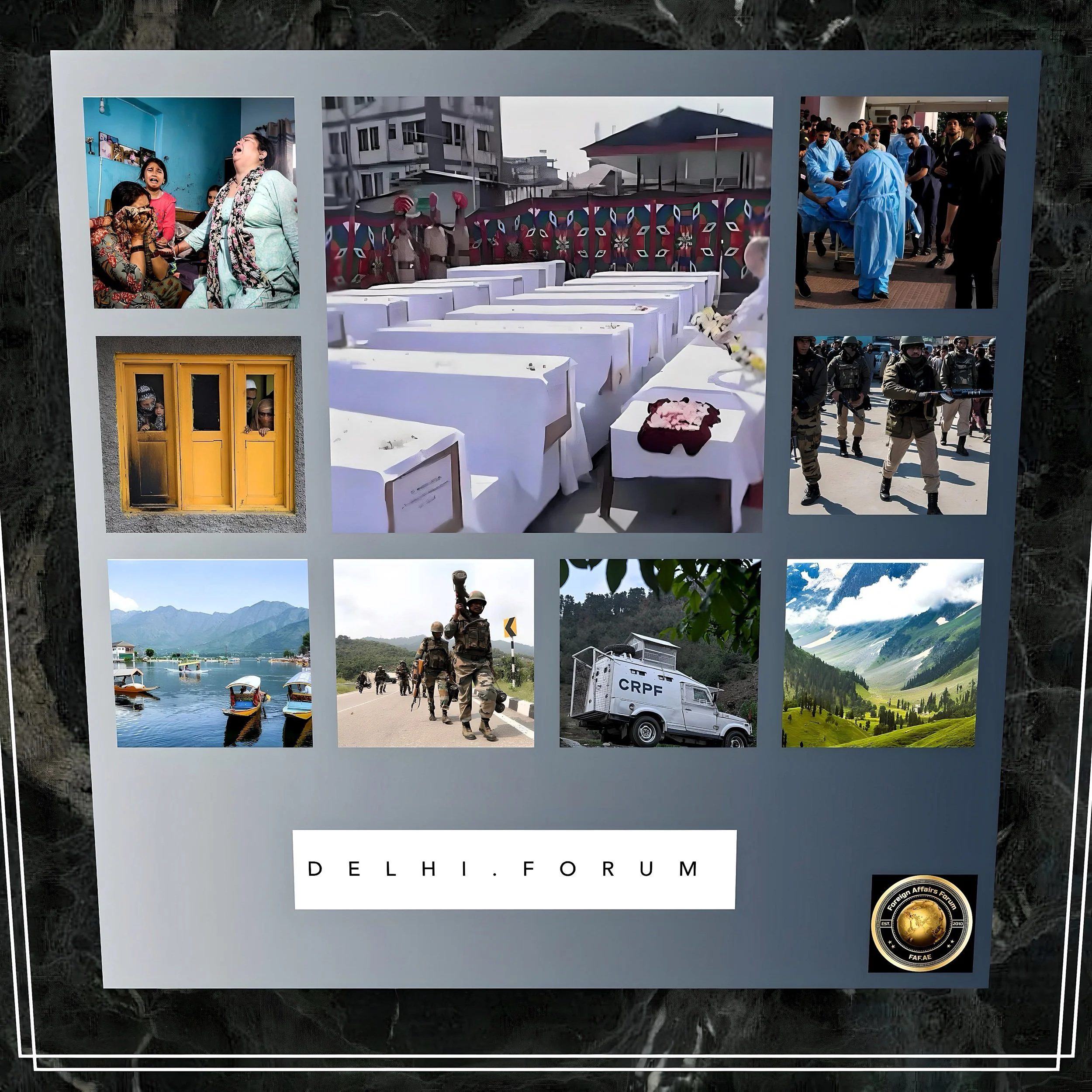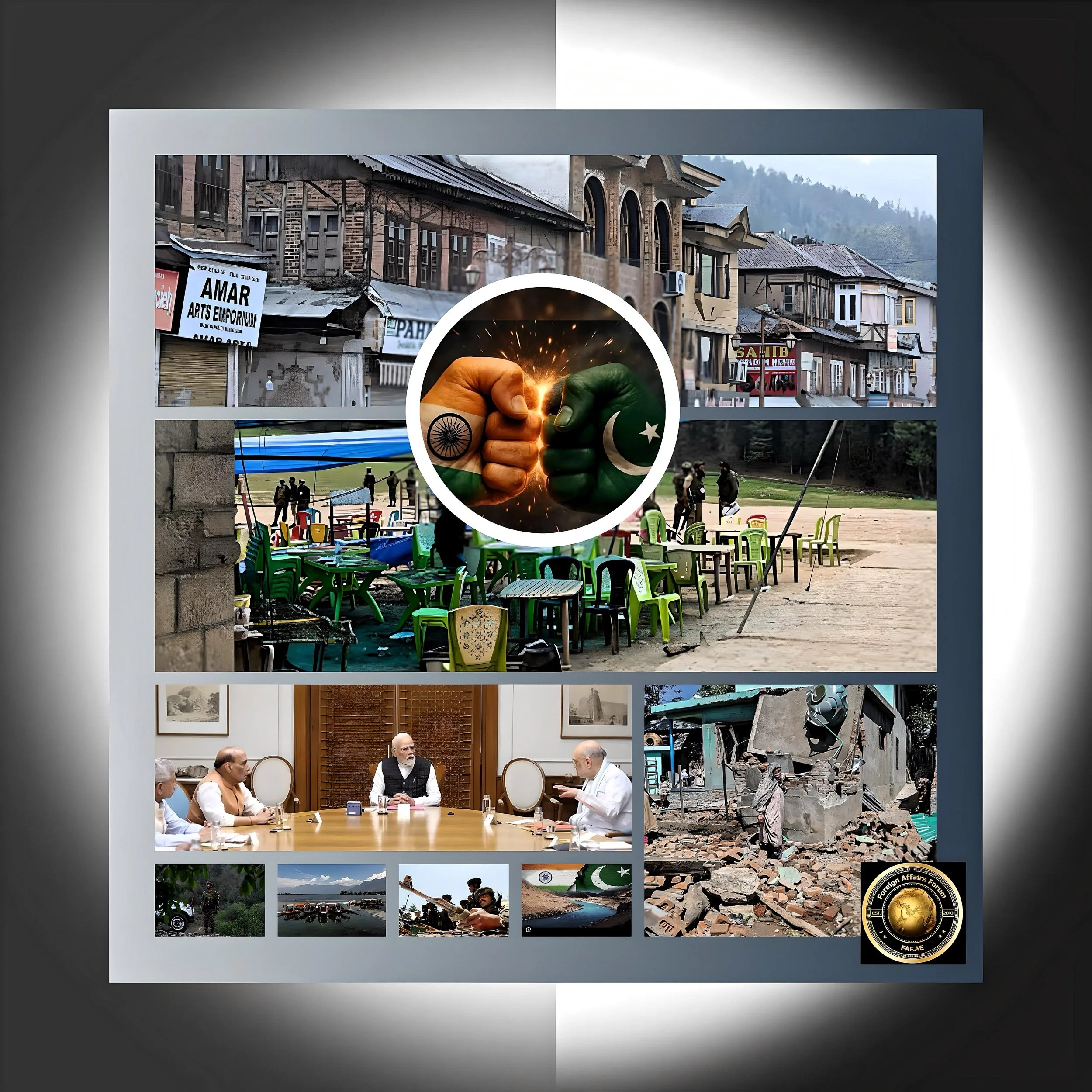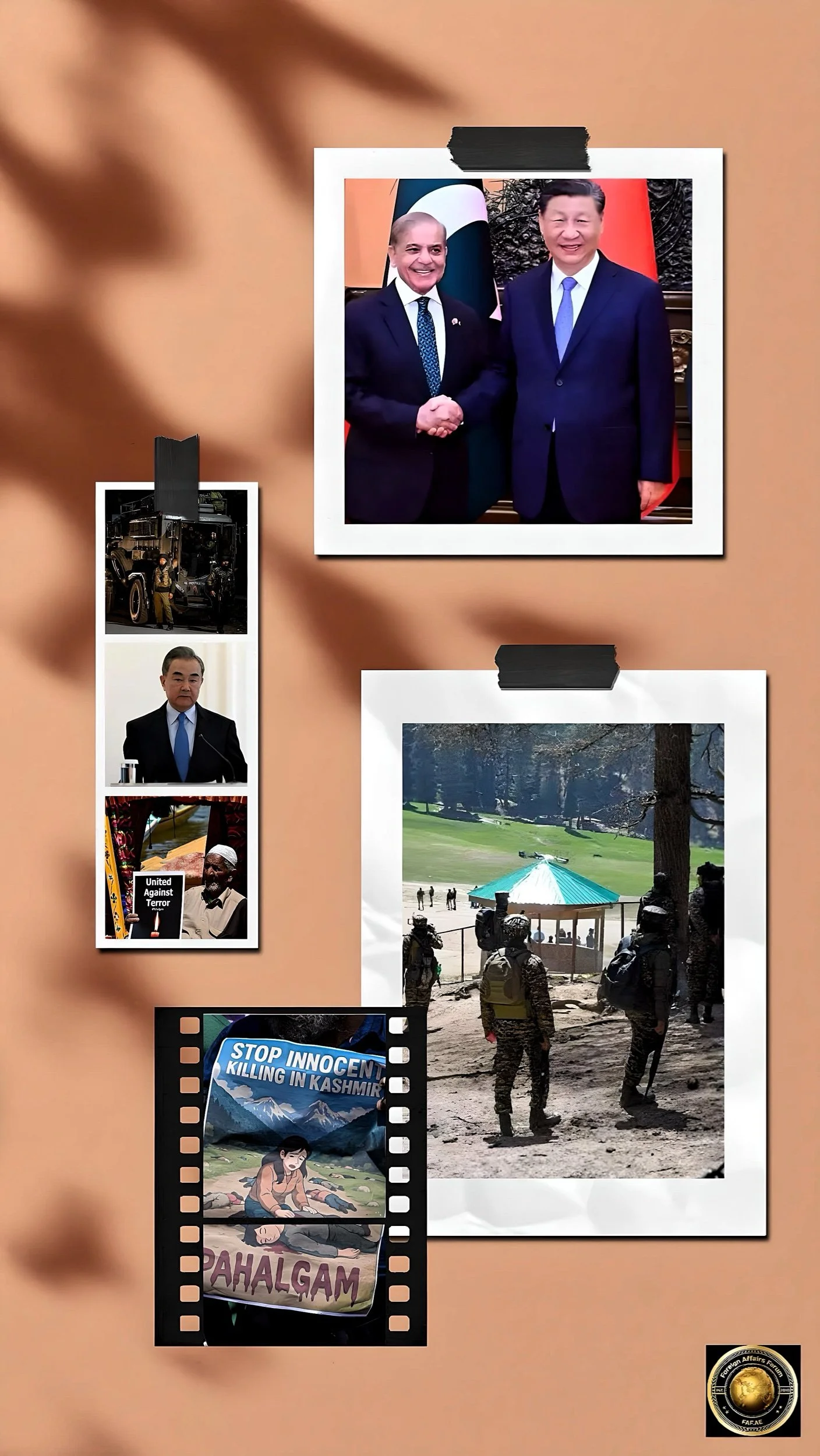Pahalgam, Kashmir , india Terror Attack: Deadly Strike Amidst US Vice President’s Visit to India
Introduction
On April 22, 2025, a devastating terrorist attack in Pahalgam, Jammu, and Kashmir claimed the lives of at least 26 civilians, predominantly tourists, in what has become the deadliest attack in the region since the 2019 Pulwama strike.
The tragedy unfolded while US Vice President JD Vance was on an official visit to India, raising questions about timing, motives, and regional security implications.
The FAF views the current situation as a temporary challenge, anticipating a return to stability in due time.
History teaches us that the positive actions of remarkable individuals can take time to bear fruit, yet they ultimately lay a foundation for enduring peace.
It is also essential to emphasize that terrorism has no rightful place anywhere in the world—no nation, no community, and certainly not within our own thoughts. India's history reveals a resilience forged through significant trials during the pre-Mughal, post-Mughal, and British imperial eras, with the nation continuously adapting to economic and political shifts.
While regimes may change, the people of India have remained united across diverse religious backgrounds for centuries.
History can attest to this enduring spirit.
The Attack: What Happened in Pahalgam
The terror attack took place at Baisaran, a meadow approximately 3 miles from the popular resort town of Pahalgam in the Anantnag district of Jammu and Kashmir.
Multiple gunmen opened fire at close range on tourists visiting the area, which is only accessible by foot or pony.
Besides the 26 fatalities, dozens more were injured, many reportedly in serious condition.
Most victims were Indian tourists who had been visiting what is often called the “little Switzerland” of Kashmir.
Security forces and medical teams were immediately rushed to the site, and the area was cordoned off as part of standard emergency response protocol.
The injured were swiftly transported to medical facilities, while authorities established multiple helpline numbers for those seeking information about relatives or friends who might have been affected.
Who Is Behind the Attack?
The Resistance Front (TRF), a shadow organization of the Pakistan-based terrorist group Lashkar-e-Taiba (LeT), has claimed responsibility for the attack.
Security sources and central agencies have attributed the violence to this group, which has been active in the region since 2019.
The TRF was formally declared a terrorist organization by India’s Ministry of Home Affairs in January 2023, which described it as a proxy outfit of LeT involved in “propaganda on terror activities, recruitment of terrorists, infiltration of terrorists and smuggling of weapons and narcotics from Pakistan into Jammu and Kashmir.”
According to Indian officials, TRF was created to give Kashmir militancy an appearance of being indigenous rather than foreign-directed.
Lashkar-e-Taiba, the parent organization of TRF, was responsible for the 2008 Mumbai terror attacks that killed 166 people.
Officials suspect the attackers may have infiltrated from the Kishtwar region in Jammu and traversed through Kokernag in South Kashmir to reach Pahalgam.
Connection to Article 370 Revocation
While there is no direct evidence linking this specific attack to the 2019 revocation of Article 370, the broader context of terrorism in Kashmir has been shaped by this constitutional change.
Article 370 had granted special autonomous status to Jammu and Kashmir since 1949.
On August 5, 2019, the Modi government revoked this special status, integrating the region more fully into the Indian Union and dividing the former state into two union territories - Jammu & Kashmir and Ladakh.
This move was controversial. The government characterized it as correcting a “historical blunder,” while critics viewed it as undermining Kashmir’s unique identity.
Home Minister Amit Shah has previously stated that “Article 370 sowed the seeds of separatism in the valley, which later turned into terrorism”.
According to him, the revocation has led to a 70% reduction in terrorism, though the recent attack demonstrates that security challenges persist.
In the five years since the revocation, security analysts note that while the Kashmir Valley has continued to face militancy-related violence, terrorism has now also spread to the previously more peaceful Jammu province.
According to reports, since 2019, at least 262 soldiers and 171 civilians have died in more than 690 incidents.
Indian Government Response
The Indian government has responded swiftly and decisively to the attack with several immediate actions:
Prime Minister’s Return: Prime Minister Narendra Modi cut short his state visit to Saudi Arabia to return to India and address the crisis.
High-Level Security Meetings
Upon arrival in Delhi, Modi chaired a key meeting at the airport with National Security Advisor Ajit Doval and External Affairs Minister S Jaishankar to assess the situation and coordinate the response.
Home Minister’s Visit
Following Modi's directive, Union Home Minister Amit Shah has traveled to Jammu and Kashmir to assess the situation on the ground.
Security Enhancement
Security has been significantly increased across India, particularly in Delhi and at tourist locations, with intensified checking and surveillance at border checkpoints.
Anti-Terror Operations
An extensive anti-terror operation has been launched to neutralize the terrorists responsible for the attack.
Support for Victims
The government has established multiple helpline numbers and provides medical assistance to the injured.
Chief Minister Omar Abdullah of Jammu & Kashmir has described the attack as “much larger than anything we’ve seen directed at civilians in recent years” and has visited Pahalgam to oversee operations.
Pakistan Connection
While the Indian government has not officially implicated Pakistan in this specific attack, the TRF’s connections to LeT establish a link to Pakistan-based terrorism.
The Ministry of Home Affairs has previously stated that TRF is involved in the “smuggling of weapons and narcotics from Pakistan into Jammu and Kashmir.”
Some security analysts have noted the timing of the attack, coming just a week after Pakistan’s Army Chief General Asim Munir’s statement that Kashmir is Pakistan’s “jugular vein,” which drew sharp criticism from India’s Ministry of External Affairs.
The attack also revives a familiar pattern seen in past terrorist incidents in Kashmir, where strikes are coordinated during high-profile international visits to gain maximum global attention.
Reaction from opposition parties
The opposition parties in India have strongly condemned the Pahalgam terror attack.
Rahul Gandhi, the Opposition Leader, met with Union Home Minister Amit Shah, Jammu and Kashmir Chief Minister Omar Abdullah to assess the situation.
He emphasized that the families of the victims deserve justice and support. The Congress party has also demanded an all-party meeting to address the situation, criticizing the government for making “hollow claims” about normalcy in Jammu and Kashmir.
Other opposition leaders, like Mallikarjun Kharge, have called for unity and a strong response to the attack.
AIMIM leader Asaduddin Owaisi condemned the Pahalgam terrorist attack, calling it “highly condemnable” and stating that the perpetrators deserve the “strictest punishment in law.” He expressed condolences to the victims and their families and prayed for the swift recovery of those injured.
Global Reactions
The international community has responded with widespread condemnation of the attack:
United States
President Donald Trump condemned the attack and planned to call PM Modi to discuss it.
US Vice President JD Vance, who was in India during the attack, expressed condolences, stating: “Usha and I extend our condolences to the victims of the devastating terrorist attack in Pahalgam, India.
Over the past few days, we have been overcome with the beauty of this country and its people.
Our thoughts and prayers are with them as they mourn this horrific attack”.
Russia
President Vladimir Putin condemned the attack and expressed solidarity with India.
Italy
Prime Minister Giorgia Meloni also denounced the violence and offered support to India.
The attack during Vance’s visit has elevated international attention on the security situation in Kashmir.
Security officials note that attacks during foreign dignitary visits are often calculated to maximize international publicity.
Broader Implications
This attack represents a significant setback for India’s efforts to promote normalcy and tourism in Kashmir following the 2019 constitutional changes.
The targeting of tourists is particularly concerning as tourism has been a key economic driver and symbol of returning stability in the region.
The surge in tourism to Kashmir had been celebrated as a bellwether for normalcy in the Valley and was driving local employment and business growth.
This attack directly threatens that progress and may have long-term implications for the region’s economy and perception of security.
Security analysts suggest this attack indicates that despite claims of improved security, militant groups retain the capability to carry out sophisticated, high-casualty attacks in Kashmir, raising questions about the efficacy of counterterrorism strategies in the region.
Conclusion
The Pahalgam terror attack stands as one of the most devastating incidents in Kashmir in recent years, carrying significant ramifications for regional security, India-Pakistan relations, and the overall situation in Jammu & Kashmir.
The Resistance Front’s claim of responsibility underscores a calculated move, particularly given the attack's timing coinciding with JD Vance’s visit to India, aimed at drawing international attention.
In response, the Indian government has acted decisively and comprehensively, implementing high-level security meetings, deploying additional forces, and launching investigations into the planning and execution of the attack.
International condemnation has been robust, with major global powers expressing unwavering solidarity with India.
As investigations progress and counterterrorism operations escalate, this attack highlights the enduring security challenges in Kashmir, despite assertions of progress following the 2019 revocation of Article 370.
The deliberate targeting of tourists signifies a troubling evolution in terrorist tactics, which could have lasting implications for the region's stability and economic growth.
Domestically, it is imperative for all political parties to unite and establish stricter safety measures, rather than engaging in a blame game like Congress, questioning the ‘Normalcy in Kashmir.’ Together, we can create a safer environment and enhance security in the region.






